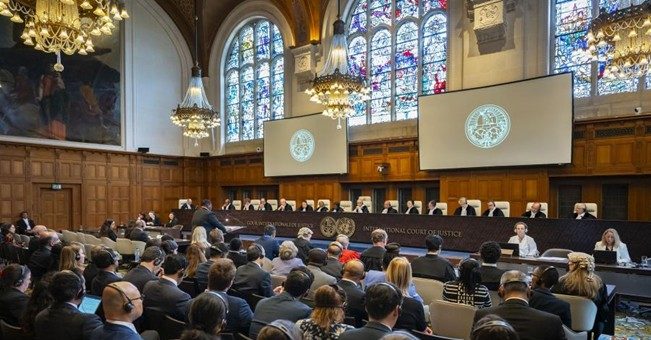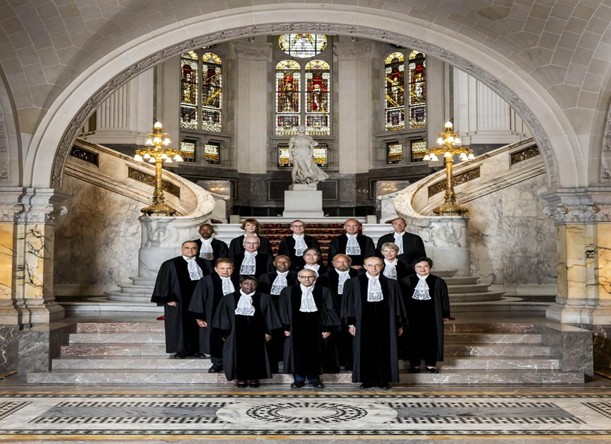Awaiting Wisdom of the World Court: Obligations of States in Respect of Climate Change

UN Photo: Seat of the ICJ, Peace Palace, The Hague, The Netherlands
I. Introduction: 2024 – Year of the Planetary Future
The year 2024 became the “Year of the Planetary Future” [Author: EPL 54 (1) 2024] with the United Nations (UN) hosting a high-profile Summit of the Future (New York; September 22-23, 2024) in succession to 2023 and 2022 that witnessed summits on the Sustainable Development Goals (New York; September 18-19, 2023) and the Stockholm+50 Conference (Stockholm; June 2-3, 2022), respectively. The outcomes of these global conferences of 2024, 2023 and 2022 showed the gravity of the smoldering planetary level crisis (here, 2024; here, 2024, here, 2023; here, 2023). The 2024 Summit of the Future was mandated by the UN General Assembly (UNGA) ‘modalities’ resolution 76/307 of September 8, 2022 . Thus, the year 2024 will be cast in stone as the Year of the Planetary Future.
«the year 2024 will be cast in stone as the Year of the Planetary Future.»
II. International Law @ Work
The year also witnessed unfolding of an unprecedented saga of the International Law @Work in the International Course of Justice (ICJ; World Court), principal judicial organ of the UN. Over the years, International Law @Work has been the running theme in this author’s lectures, comprising a brief pictorial presentation or screening of an audio or video clip, to hammer the actual working of International Law at the beginning of each class in his two celebrated MA courses: (i) International Law of Peace (Monsoon Semester); and (ii) Legal Controls of International Conflicts (Winter Semester). Therefore, a flurry of cases (contentious and advisory proceedings) coming to the ICJ in recent years underscore one of the facets of subtle processes of actual working of International Law. Apart from the Advisory Opinion proceedings during 2022-2024 triggered by the UNGA (vide resolution 77/247 of December 30, 2022) on Legal Consequences Arising from the Policies and Practices of Israel in the Occupied Palestinian Territory, including East Jerusalem (July 19, 2024), the World Court has been saddled with another Advisory Opinion sought by the UNGA (vide resolution 77/276 of March 29, 2023): Obligations of States in Relation to Climate Change. The marathon proceedings in the case witnessed Written Statements (91 till April 12, 2024) and comments on the Written Statements (by 62 States and Organizations, till August 15, 2024) and Oral Presentations (by 96 States and 11 International Organization by December 13, 2024). The UNGA request for an Advisory Opinion of the ICJ came in the backdrop of growing scientific warnings and other assessments that have predicted that even if greenhouse gas (GHG) emissions hit zero tomorrow, the climate chaos is likely to cost yearly an estimated $38 trillion (in the range of 19-59 trillion dollars) by 2050. Such staggering cost underscores both the gravity and implications of climate change on the global economy as one of the “triple planetary crises.” It was duly flagged and dubbed as “climate emergency” by the feisty UNSG Antonio Guterres at the Stockholm+50 Conference (June 02, 2022).
«climate chaos is likely to cost yearly an estimated $38 trillion (in the range of 19-59 trillion dollars) by 2050»

Source: ICJ: Oral Presentations Venue: The Great Hall of Justice, Peace Palace: December 02-13, 2024
III. UNGA’s Extraordinary Request
The Advisory Opinion sought by the UNGA, through a communication sent by the UNSG to the ICJ President (April 12, 2023) was an indication of the crisis at work. The ICJ has been requested to clarify on two specific questions mandated by the plenary organ of the UN (vide resolution 77/276 of March 29, 2023):
(a) What are the obligations of States under international law to ensure the protection of the climate system and other parts of the environment from anthropogenic emissions of greenhouse gases for States and for present and future generations;
(b) What are the legal consequences under these obligations for States where they, by their acts and omissions, have caused significant harm to the climate system and other parts of the environment, with respect to:
- States, including, in particular, small island developing States, which due to their geographical circumstances and level of development, are injured or specially affected by or are particularly vulnerable to the adverse effects of climate change?
- Peoples and individuals of the present and future generations affected by the adverse effects of climate change?
The above-mentioned two questions provide general framework for mapping the “obligations of states” as euphemistically articulated in the UNGA request. However, as the history of previous Advisory Opinions shows, the Court can even go beyond the question presented to it wherein it can spring a surprise with a new formulation and/or interpretation that was not originally asked or contended by the States before it. The finding of a caveat “very survival of a State would be at stake” in “extreme circumstance of self-defense” (Opinion, page 43, paragraph 105 (2) E) by the Court in its July 08, 1996 Advisory Opinion in the Legality of the Threat or Use of Nuclear Weapons is a case in point. However, as this author contended in analysis of the 1996 Opinion (IJIL 37 (2) 1997 at 218), an invocation of said unwarranted miasma and interpretation in the 1996 case was “contrary to the law of the Charter and other corpus juris on the matter and, indeed to the totality of international law”. Thus, any ‘grey area’ suggested by the majority opinion would need to be judged on the touchstone of the Law of the Charter and larger corpus of International Law. The World Court is a human institution and not infallible.
In view of the specific questions set out in the UNGA request (March 29, 2024), the elaborate processes laid down by the Court for the filing of Written Statements (91 States and 11 International Organizations; April 12, 2024), Written Comments on those Statements (62 as on August 15, 2024) as well as Oral Presentations (96 States and 11 International Organizations; December 13, 2024) is now complete. Notwithstanding existence of the three legal instruments (1992 UNFCCC, 1997 Kyoto Protocol; 2015 Paris Agreement) for global regulation of climate change and holding of annual Conference of Parties (COP) meetings (29 held so far; Baku COP29, November 11-24, 2024), it seems, most of the States and International Organizations have been looking for an authoritative exposition on the illusive “obligations of States” from the world court. Having prepared the initial draft of the Written Statement for the Republic of India (March 21, 2024), at the special request of the Ministry of External Affairs, this author is cognizant of the general view and desire of the sovereign states to stay with the chosen course that obligations of States with respect to climate change primarily emanate from 1992 UNFCCC, 1997 Kyoto Protocol, and 2015 Paris Agreement. As a corollary, it is legitimate for the State Parties to expect the ICJ to “avoid devising new or additional obligations beyond what is already agreed under the existing climate change regime” (see: Indian Written Statement, March 21, 2024; conclusion, page 39, paragraph 106 (iii).
IV. Written Statements & Oral Presentations
Article 65 (1) of the Statute of the ICJ enjoins upon the principal judicial organ of the UN to “to give an advisory opinion on any legal question at the request of whatever body may be authorized by or in accordance with the Charter of the United Nations to make such as request”. This article needs to be read in the context of the main provision — Article 96 (1) of the UN Charter – that provides: “The General Assembly or the Security Council may request the International Court of Justice to give an advisory opinion on any legal question”. There is no obligation per se for the Court to give an opinion since the article contains the word “may give an advisory opinion”. In the Obligations of States in Respect of Climate Change, the Court undertook an unprecedented process of consultations wherein it invited written statements, comments on those written statements and oral presentations as well as held a sitting (on November 26, 2024) with scientists of the Intergovernmental Panel on Climate Change (IPCC; set up by the UNGA (vide resolution 43/53 of December 08, 1988, paragraph 5). It was “to enhance the Court’s understanding of the key scientific findings which the IPCC has delivered through its periodic assessment reports”.
As is the practice before International Courts and Tribunals (Author: “ICTs as New Environmental Sentinels”, EPL 51 (1-2) 2021, 121-134), eminent International Law scholars based at prestigious Universities are usually chosen by most of the States to argue in their cases before the ICJ. The articulation of the normative framework of International Law by outstanding scholars in their arguments before the Court has in fact helped in the development of International Law for more than a century (both the ICJ and its predecessor PCIJ). In all such cases, it is the person who prepares the Written Statement is usually inducted as a member of the State Delegation to make the Oral Presentations. In the wake of marathon process of Oral Presentations (December 02-13, 2024) by 96 States and 11 International Organizations (ICJ Press Release, December 13, 2024), many leading International Law scholars took the floor to make an exposition on this historic case before the World Court.
For this author, as a long-standing teacher in the field of International Law, the legal interpretations of the treaty texts, illustrations of best State Practices and precedents of the previous landmark cases by counsels of more than 100 States and IOs represented the classic example of “International Law@Work”. Many prominent International Law scholars made Oral Presentations before the ICJ including the following: Jorge Viñuales (Vanuatu and Melanesian Spearhead Group), Cambridge University Professor, who did the original ground work to prepare the case brief for Vanuatu that led the UNGA’s March 29, 2023 request; Andreas Zimmermann (Germany), Phoebe Okowa (Kenya) and Mārtiņš Paparinskis (Latvia); Sandrine Maljean-Dubois (Democratic Republic of the Congo) and René Lefeber (the Netherlands); Jean-Marc Thouvenin (Seychelles); Pierre-Marie Dupuy (Organization of African, Caribbean and Pacific States) and Christina Voigt (IUCN).

Source: ICJ: Fifteen ICJ Judges who will render the much-awaited Advisory Opinion
Traditionally most of the ICJ judges come with strong academic background as scholars of International Law. Hence an appearance of outstanding International Law scholars (as compared to government officials, diplomats or domestic lawyers) in the ICJ cases (both contentious and advisory proceedings) always makes a great difference. Therefore, the States Parties always make it a point to adhere to this time-tested global practice by inducting the scholars who were specially requested to prepare the Written Statement to also make an Oral Presentation before the ICJ.
On the whole, all the presentations (written and oral) made by the States and IOs brought a variety of legal arguments that constituted the mosaic of different approaches in addressing the challenge of global climate change. For instance, among the developing countries, Brazil (Written Statement, March 21, 2024; Oral Presentation, December 03, 2024) highlighted its commitment to ambitious emissions reductions, stressing that despite being a developing country, it faces significant challenges like poverty eradication and extreme climate impacts. The Brazilian envoy on climate change, Luiz Alberto Figueiredo Machado, underscored the principle of “common but differentiated responsibilities”, asserting that high-emitting developed countries bear the greatest burden in addressing the crisis. China (Written Statement, March 22, 2024; Oral Presentation, December 03, 2024), meanwhile, urged the ICJ to avoid creating new legal obligations and focus on existing frameworks such as the 2015 Paris Agreement on climate change. As one of the world’s largest emitters, China argued that developed nations must bear historical responsibility, while developing countries require longer timelines to meet climate goals. The Indian approach has been reflected in the Indian Written Statement of March 21, 2024; Oral Presentation, December 05, 2024). Since this author prepared the initial draft of the said Written Statement, it is worth spelling out some of the core elements of the Indian approach that emphasizes that:
“There are obligations of States under general international law for controlling transboundary harm. However, the obligations of States with respect to climate change are under the 1992 UNFCCC, and its instruments- the 1997 Kyoto Protocol, and the 2015 Paris Agreement…the Court may exercise due caution to avoid devising new or additional obligations beyond what is already agreed under the existing climate change regime, which takes into consideration the historical emissions, climate justice and the principles of equity and common but differentiated responsibilities and respective capabilities (CBDR-RC), including equitable access to the global carbon budget” (see: Written Statement, March 21, 2024; page 39, paragraph 106 (iii)
Significantly, as the host country of 2015 Paris Agreement, French Republic committed “to provide €6 billion a year funding from 2021 to 2025” (Written Statement, page 48, paragraph 240; Oral Presentation, December 05, 2024). Without spelling any specific approach, France left the task to the https://www.icj-cij.org/sites/default/files/case-related/187/187-20241108-pre-01-00-en.pdfwisdom of the ICJ to “strengthen the legal framework for action by States to combat climate change…to find the appropriate answers so as to identify the applicable rules of positive law, in accordance with its task of applying international law and clarifying it when necessary” (page 51, paragraph 251). However, the two leading players on the climate chessboard, European Union (EU) and the United States took positions that reflect their traditional view of the global regulatory approach. The European Union (Written Statement, March 22, 2024; Oral Presentation, December 13, 2024) emphasized cooperation and stressed the non-adversarial nature of the advisory proceedings. The EU representatives pointed to the importance of existing treaties in addressing climate change but stopped short of calling for enforcement mechanisms. On the other hand, the United States (Written Statement, March 22, 2024; Oral Presentation, December 04, 2024) acknowledged the severity of the climate crisis but argued that international treaties like the Paris Agreement are not legally binding. Margaret Taylor, the US representative, also rejected the notion that “common but differentiated responsibilities” is a fundamental principle of international law.
On the basis of perusal of the Written Statements as well as appraisal of the Oral Presentations, upon completion of this entire process on December 13, 2024, some of the ICJ judges asked the States and International Organizations who appeared before it to respond to the following questions:
- what, if any, specific obligations arise under international law for those States within whose jurisdictions fossil fuels are produced;
- whether the object and purpose of the Paris Agreement and the framework of the climate regime more generally have any effect on the interpretation of Article 4 of the Paris Agreement (on mitigation, including the preparation of NDCs) and if so, what effect;
- the legal content of the right to a healthy environment and its relation to other human rights relevant to the advisory opinion; and
- the significance of some States’ declaration, upon ratification of the UNFCCC and the Paris Agreement, that they do not renounce rights under State responsibility and that no provision in the treaties can be interpreted as derogating from principles of general international law or any claims or rights concerning compensation and liability due to the adverse effects of climate change.
The Court sought responses on these issues by December 20, 2024 (ENB, December 16, 2024). Now the Court will undertake extensive deliberations. If the ICJ accepts jurisdiction and agrees to provide an Advisory Opinion to the UNGA, it would be pronounced in the open court. After the ICJ renders an opinion, possibly in the first half of 2025, the ball would revert back to the requesting UN organ (UNGA) who, in turn, would examine the Opinion to decipher the future pathway by suggesting the decisive course correction. Still, any such remedy and the framework for salvation from the climate crisis, undertaken by the collective wisdom of the UNGA, would need to be made to work upon the bedrock of International Law.
«After the ICJ renders an opinion, possibly in the first half of 2025, the ball would revert back to the requesting UN organ (UNGA) who, in turn, would examine the Opinion to decipher the future pathway»
Since there are indications of floundering of the UNFCCC process, as seen in the outcomes of last three successive COP meetings at Baku (COP29, November 11-24, 2024), Dubai (COP28, November 30-December 12, 2023) and Sharm-al-Sheikh (COP27, November 6-18, 2022), it would possibly yield critical space to the ICJ to illuminate upon some seminal aspects for affixing obligations of the states within and beyond the three principal international legal instruments on climate change (1992 UNFCCC, 1997 Kyoto Protocol; 2015 Paris Agreement). However, the practical difficulties experienced in operationalizing the decisions of the COP meetings in the last three decades do not augur well especially as regards transfer of technology or new and additional climate funding commitments that hold the key to usher into transition away from the predominantly fossil fuel based global economy. As a result, the future trajectory of the climate change regulatory process remains uncertain. It, in turn, presents an ideational challenge for international law scholars, the UN General Assembly and the UNFCCC regulatory process. As argued in one of this author’s ideational papers (Environmental Policy and Law 52 (5-6) 2022, 331-347), the climate crisis now calls for earnestly elevating the normative ambit of climate change regulation from a common concern to a planetary concern (here, EPL, 54 (1) 2024, 3-14; here, EPL Blog, January 5, 2023; here, EPL, 52 (5-6) 2022, 331-347). Hence, the UNGA would need to take charge by adopting an appropriate normative resolution possibly during the 80th session (after the ICJ renders its Advisory Opinion in 2025) and beyond to provide future directions to the global regulatory approach on climate change (especially 1992 UNFCCC and 2015 Paris Agreement processes). The ICJ will be required to provide an answer to two specific questions raised in the UNGA request (resolution 77. 276) of March 29, 2023. What would the principal legal organ of the UN do to nudge the States and the UNGA to resolve the riddle of the global climate change?

Source: UNICEF/Lasse Bak Mejlvang: Small Island nations, such as Tuvalu face greater risk from sea level rise arising from extreme climatic changes.
V. Making International Law Work
In view of the above legal stratagems and crafting of tools and techniques to stabilize GHG emissions enshrined in the climate regime (1992 UNFCCC, 1997 Kyoto Protocol and 2015 Paris Agreement), the stagnating regulatory approach has brought in fatigue effect. As an off-shoot, there has been rapid proliferation of climate change litigations in domestic courts. Ironically, the Baku COP29 (November 11-24, 2024 resulted in literal abandonment of the multilateral climate change negotiations process by some States and lukewarm attitudes of other States. It was even reflected in the non-participation at the highest levels or even ministerial level as well as statements on possible withdrawals from the Paris Agreement. As a result, the developing countries may soon realize the futility of undertaking NDCs without the developed countries in effect carrying out their part of the legal commitments – the cornerstone of the climate change regulatory juggernaut. The Baku COP29 decision (here: CMA.6: New collective quantified goal on climate finance, paragraph 8; here: Press Release, November 24, 2024) “to set a goal, in extension of the goal referred to in paragraph 53 of decision 1/CP.21, with developed country Parties taking the lead, of at least USD 300 billion per year by 2035 for developing country Parties for climate action” requires cautious optimism in view of the previous experience of such climate funding commitments remaining on paper.
In the quest for mapping the future course of action, some of this author’s ideational works (here, EPL, 54 (1) 2024, 3-14; here, EPL Blog, January 5, 2023; here, EPL, 52 (5-6) 2022, 331-347) have sought to find answers to the challenge of global climate change. Premised upon the principle of state responsibility and differentiation, it will necessitate earnestly walking-the-talk by those states who caused the climate change problem in the first instance with all legal obligations, consequences and requirements. Making the architecture work remains the biggest challenge to overcome the climate emergency so as to secure our planetary future. Notwithstanding the annual ritual of the COP meetings, the actual action on the ground takes place at a snail’s pace for reduction of GHG emissions to attain UNFCCC objective of “stabilization of greenhouse gas concentrations in the atmosphere” (Article 2, UNFCCC).
«Making the architecture work remains the biggest challenge to overcome the climate emergency so as to secure our planetary future.»
Entire climate change global regulatory process (1992 UNFCCC, 1997 Kyoto Protocol and 2015 Paris Agreement) seems to be entangled in the quagmire of protecting national interests of the States Parties driven by their fossil fuel based economies. The dismal outcomes of the three (2024, 2023 and 2022) back-to-back global events Summit of the Future (New York; September 22-23, 2024), Sustainable Development Goals (New York; September 18-19, 2023) and Stockholm+50 Conference (Stockholm; June 2-3, 2022) have dampened prospects for squarely addressing the climate emergency. As we look ahead, it is high time for the States to engage in a major course correction in their respective regulatory approaches – as preliminarily spelled out above. It calls for audacity of hope against hope for wiser counsels to prevail. As an immediate goal, the State Parties need to elevate the normative ambit of climate change regulation as a planetary concern. Since the UN provides secretariat support including appointment of the Executive Secretary, the responsibility for a major initiative remains with the UNGA. To trigger such a process, the forthcoming Advisory Opinion of the ICJ can nudge, provide some guidance and robust basis to locate “obligations of the states” within the larger realm of “planetary concern”.
VI. Conclusion
It is in the above-mentioned larger context, state of the global climate change regulatory structure and limits of the regime specific multilateral negotiations, the ICJ Advisory Opinion could provide crucial guidance to the UNGA (requesting UN organ). In designing an Opinion, as the well-established jurisprudence shows, the ICJ has sufficient room for ‘widening the horizons’ through the instrumentality of interpretation on “obligations of states” in International Law. It remains to be seen as to how far the ICJ draws upon its past practices, precedents, processes. Apart from the collective wisdom of the Sovereign States and IOs, as articulated in the Written and Oral Proceedings in the matter, the content of the Opinion would depend upon current composition of the Court. The ICJ judges, especially with strong scholarly backgrounds, in general, venture to innovate, extrapolate and read within the fine texts of the three climate change instruments. It may possibly yield a “decisive course correction” (here, EPL, 54 (1) 2024, 3-14; here, EPL Blog, January 5, 2023; here, EPL, 52 (5-6) 2022, 331-347). As of now, for deciphering obligations of states in respect of climate change, we need to await the wisdom of the ICJ judges who represent the principal legal systems of the world.

